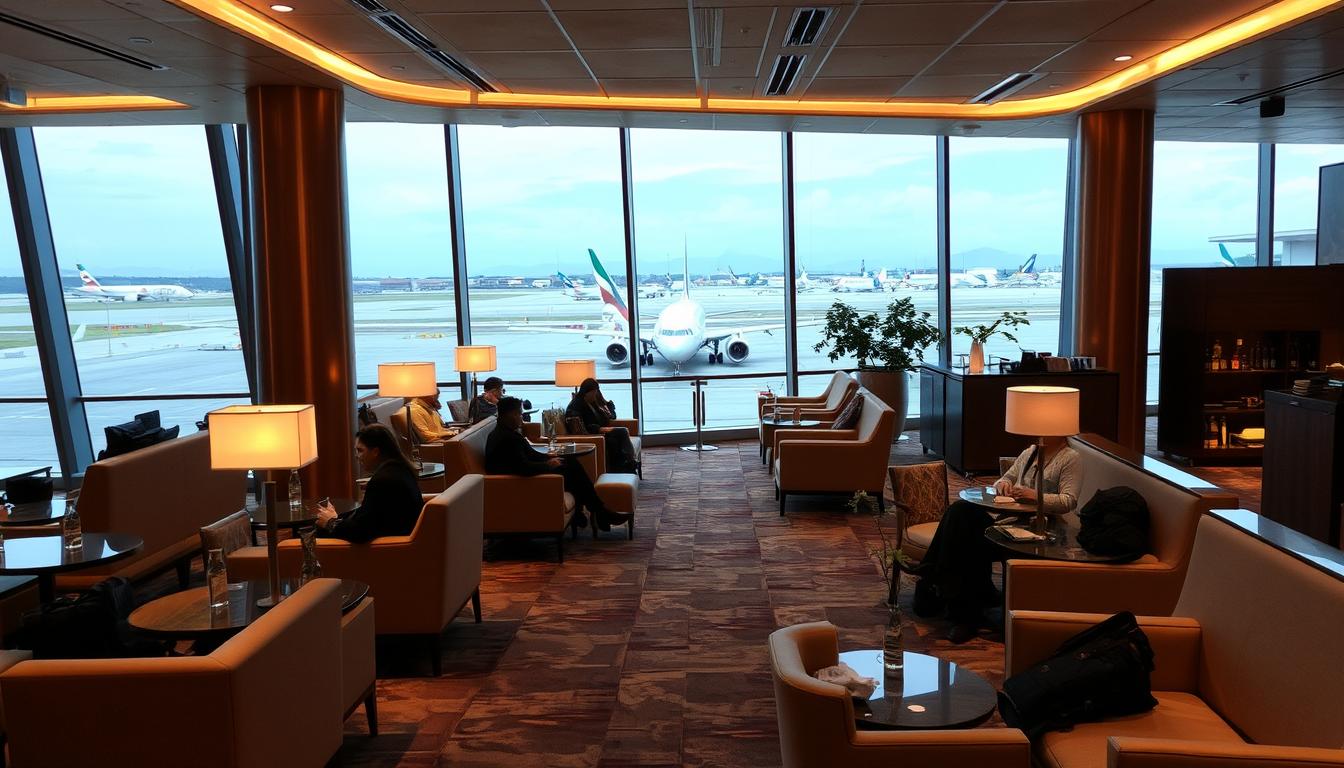Economic stability is key for building a strong economy that can handle ups and downs. It also helps keep growth steady and sustainable. In the US, knowing what makes an economy resilient is important for everyone.

TD Cash Back Visa Infinite* Card
A stable economic setting boosts investment and creates more jobs. This leads to better living conditions for people. By understanding economic stability, we can discuss its effects on growth and the factors that help an economy succeed.
Anúncios
Understanding Economic Stability
Economic stability means an economy is steady, showing little change in key areas. It focuses on steady growth, job numbers, and stable prices. Economic stability is crucial. It builds trust among consumers and investors. This leads to more spending and investments.
Definition and Importance of Economic Stability
Economic stability means everything in the economy runs smoothly, with few ups and downs. This stability is key for allowing people to plan and make smart choices. It creates a positive setting for businesses to grow and innovate. This is vital for the economy’s future health.
Indicators of Economic Stability
To understand the health of an economy, we look at certain signs. These include:
- Consistent GDP growth
- Low unemployment rates
- Stable prices
- Healthy levels of consumer confidence
- Substantial business investment

Key Factors Contributing to Economic Growth
Economic growth depends on different key elements. Understanding consumer spending and business investment shows their importance in the economy. As people become more confident, they spend more. This leads to business growth and more jobs. Business investment is also crucial. It improves production and efficiency. Moreover, deregulation helps create a more open market. This encourages innovation and entrepreneurship.
Consumer Spending and Business Investment
Consumer spending is vital for the economy. When people are financially secure, they buy more goods and services. This demand boosts businesses and prompts more investment. These investments lead to new jobs and products. They also drive innovation. Together, consumer spending and business investment support strong growth.
Deregulation and Its Impact
Deregulation can boost the economy by removing barriers. It makes businesses more efficient and adaptive. This encourages competition and new businesses. However, we must be cautious with deregulation. We need to avoid too much risk that can harm the economy. A balanced approach to deregulation is key for lasting prosperity.
The Role of Government in Economic Stability
The government helps keep the economy stable, using fiscal and monetary policies. These strategies manage economic activity and promote steady growth. It’s important to understand these policies and their impact on the economy.
Fiscal Policies and Their Effects
Fiscal policy is about how government spending and taxes influence the economy. By adjusting these, the government can either boost or slow down economic activity. For example, more public spending can create jobs and growth, especially during tough times.
But when the economy is too hot, cutting spending can prevent inflation. This shows how fiscal policy can control economic ups and downs.
Monetary Policies for Economic Growth
The Federal Reserve handles monetary policies, which affect money supply and interest rates. These policies are important for economic growth. Changing interest rates can make borrowing cheaper or more expensive, which affects spending and inflation.
Fiscal and monetary policies need to work together. This balance is key to achieving the right economic conditions and keeping the market stable.
Economic Stability and Employment
Economic stability is key in shaping job markets. It deeply affects both individuals and communities. Changes in unemployment rates highlight the health of an economy, touching various groups in unique ways.
Unemployment Rates and Their Implications
Unemployment levels are closely tied to economic health. Low unemployment means a strong economy, which boosts consumer trust and business investment. High unemployment, however, can slow down the economy. It leads to more people depending on government help and less consumer spending.
Impact on Youth Employment
Young people often find it harder to get jobs than older adults. This issue can disrupt economic stability, as high youth unemployment affects future growth. It’s crucial to overcome these obstacles to help the economy.
Global Economic Conditions Affecting Stability
In our world today, how countries do business with each other is very important. This trading shapes how strong or weak a country’s economy might be. Knowing how these parts fit together helps us see potential effects on countries.
International Trade and Economic Interconnectivity
Trading globally is key for growing the world’s economy. It lets countries focus on what they make best, leading to new ideas and competition. But, issues like tariffs and trade wars can upset this balance. Changes in how countries trade can change prices and mess with how things are made, affecting market stability.
- Tariffs can make things more expensive for people and businesses, making the economy struggle.
- Trade agreements help make trading smoother, supporting a stronger economy.
- While regional trade groups promote working together, political disagreements can slow things down.
Geopolitical Factors
Geopolitics directly influences a country’s economic strength. Wars, sanctions, and how countries get along decide how easy it is to trade. Countries in conflict might attract less investment and have a harder time trading, which hurts their economy.
- Having a stable government attracts investors and helps the economy grow.
- Political disagreements can make prices for important goods unpredictable, hitting markets hard.
- Working together globally can lessen risks and help economies stay strong through tough times.
Strategies to Enhance Economic Stability
Effective strategies for economic stability put a focus on long-term investments and jobs for everyone. Nations use these strategies to make their economies better for a long time. They invest in things like infrastructure and offer good jobs, which are key for growth and stability.
Investing in Infrastructure
Putting money into infrastructure is essential for a stable economy. Better roads and communication help businesses work better and create jobs in construction. These investments also bring in more money and boost efficiency, important for growth that lasts.
Promoting Decent Work Opportunities
Ensuring everyone has access to good jobs makes the economy fairer. When everyone can work, the benefits of growth reach more people. Supporting fair pay and safe jobs boosts productivity and cuts down on unequal incomes. This makes the whole economy stronger.
Challenges to Achieving Economic Stability
Economic stability is hard to achieve due to many challenges. These include changes in global dynamics and market conditions. It’s crucial for governments and organizations to work on these issues. They need to keep the economy strong despite global threats and the rise of informal jobs.
Current Global Economic Threats
Things like inflation, trade problems, and supply chain issues pose big threats to the economy. They slow down growth and make people cautious about spending and investing. Reasons for these threats are:
- Rising national debts that influence government spending plans.
- Geopolitical conflicts hurting international trade.
- Natural disasters and illnesses that mess up supply chains.
Informal Employment Risks
Informal jobs add another challenge. People in these jobs don’t have the same security or benefits, which puts them at risk during hard times. The growth in temporary jobs and gigs is making this problem bigger, causing:
- Workers’ earnings to be less stable.
- Difficulty in knowing how many people are really working.
- Problems for workers trying to get help from social programs or financial services.
Economic Stability: Ensuring a Robust Economy
Economic resilience is key for building strong economies that handle challenges well. It does more than help us survive tough times. It touches different parts of society. Investing in this resilience helps in both bad times and good, driving growth.
Positive Effects of Economic Resilience
Becoming economically resilient lets a country manage and succeed through tough situations. This brings many good results:
- Less risk during financial downturns, leading to quicker recovery.
- More jobs are created, giving people stable work options.
- Better life quality, as a strong economy boosts public services and infrastructure.
It’s up to policymakers to make choices that boost this resilience. By doing so, they guide communities to a better future. And they make sure everyone enjoys the perks of a stable economy.
The Role of Financial Institutions in Stability
Financial institutions are key for economic stability as they give out credits. They offer loans to people and businesses, helping essential spending and investments. This boosts consumer confidence and sparks economic growth, making the economy stronger.
Access to Credit and Economic Growth
Credit access directly boosts economic growth. When folks and companies can get loans, they spend on goods, services, and building up their businesses. This spending creates jobs and keeps the economy moving. A strong credit market means a prosperous economy, especially when loans are fair to all communities.
Banking Reforms and Financial Stability
Banking reforms keep the economy stable. After the 2008 crisis showed the banking sector’s weak spots, there was a push for tighter rules. The reforms make banks stronger by adding strict oversight and making them keep more money in reserve. This leads to more trust and less risk in the finance world. Thus, stronger rules help prepare for future crises, keeping the economy stable.
Conclusion
Economic stability is key for a strong and active economy. It means the government, global market trends, and local economy rules all play a part. Knowing how these factors work together is crucial for those making policies and leading businesses.
A healthy economy is super important because it affects people and their communities. To keep the economy stable, we need good infrastructure, fair job opportunities, and smart money management. These steps help us stay strong, even when tough times come.
Looking ahead, it’s clear we need many strategies to keep the economy stable. We need to create helpful rules, encourage new ideas, and work well with other countries. All these efforts are important to build an economy that is good for everyone, shaping a future where growth and better living go hand in hand.
FAQ
What is economic stability, and why is it important?
What indicators reflect economic stability?
How do consumer spending and business investment drive economic growth?
What role do government policies play in maintaining economic stability?
How do unemployment rates affect economic stability?
What are global conditions that can influence economic stability?
Why is investing in infrastructure crucial for economic stability?
What are the main challenges to achieving economic stability?
How does economic resilience contribute to stability?
What is the role of financial institutions in maintaining economic stability?
Conteúdo criado com auxílio de Inteligência Artificial



